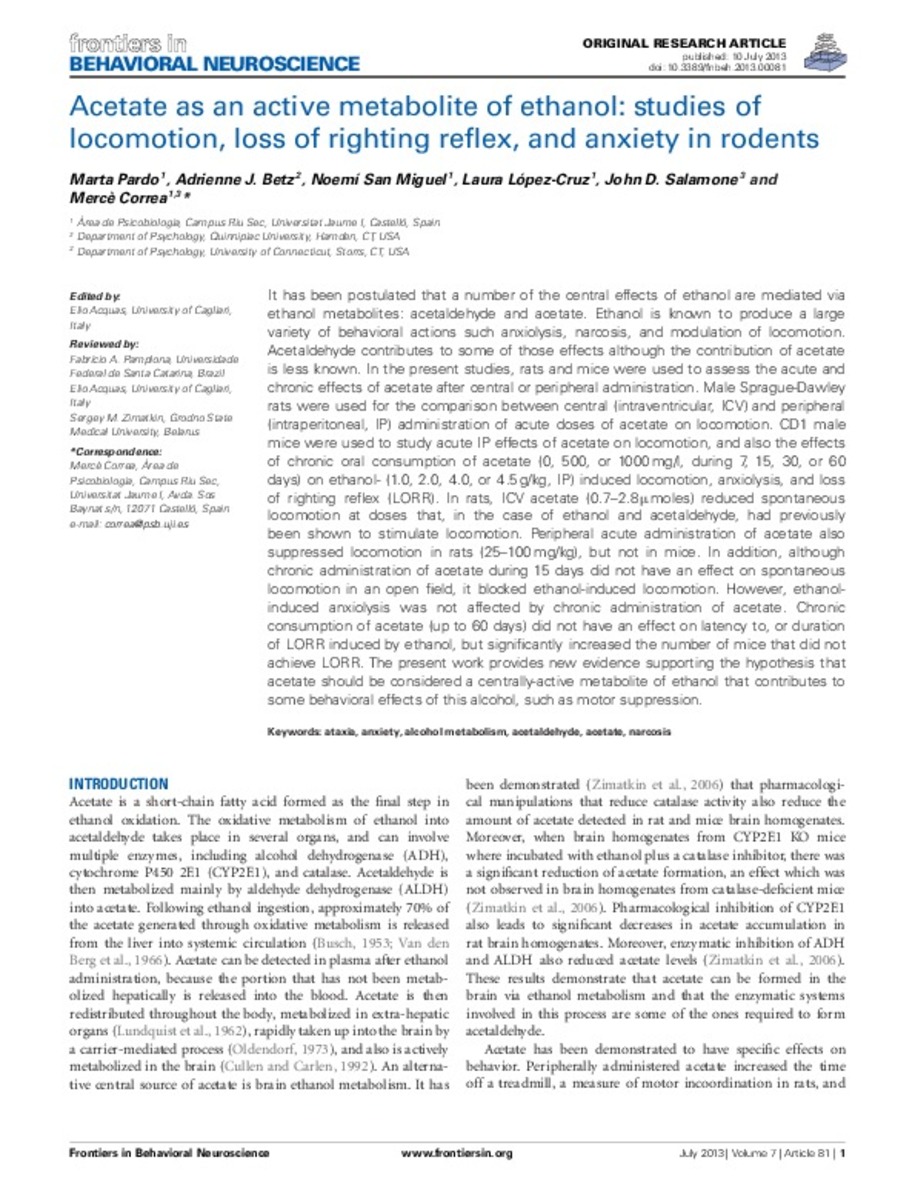Mostrar el registro sencillo del ítem
Acetate as an active metabolite of ethanol: studies of locomotion, loss of righting reflex, and anxiety in rodents
| dc.contributor.author | Pardo Andrés, Marta | |
| dc.contributor.author | Betz, Adrienne J. | |
| dc.contributor.author | San Miguel Segura, Noemí | |
| dc.contributor.author | López Cruz, Laura | |
| dc.contributor.author | Salamone, John | |
| dc.contributor.author | Correa, Merce | |
| dc.date.accessioned | 2014-03-13T19:05:16Z | |
| dc.date.available | 2014-03-13T19:05:16Z | |
| dc.date.issued | 2013 | |
| dc.identifier.citation | Front Behav Neurosci. 2013; 7: 81. | ca_CA |
| dc.identifier.issn | 1662-5153 | |
| dc.identifier.uri | http://hdl.handle.net/10234/87109 | |
| dc.description.abstract | It has been postulated that a number of the central effects of ethanol are mediated via ethanol metabolites: acetaldehyde and acetate. Ethanol is known to produce a large variety of behavioral actions such anxiolysis, narcosis, and modulation of locomotion. Acetaldehyde contributes to some of those effects although the contribution of acetate is less known. In the present studies, rats and mice were used to assess the acute and chronic effects of acetate after central or peripheral administration. Male Sprague-Dawley rats were used for the comparison between central (intraventricular, ICV) and peripheral (intraperitoneal, IP) administration of acute doses of acetate on locomotion. CD1 male mice were used to study acute IP effects of acetate on locomotion, and also the effects of chronic oral consumption of acetate (0, 500, or 1000 mg/l, during 7, 15, 30, or 60 days) on ethanol- (1.0, 2.0, 4.0, or 4.5 g/kg, IP) induced locomotion, anxiolysis, and loss of righting reflex (LORR). In rats, ICV acetate (0.7–2.8 μmoles) reduced spontaneous locomotion at doses that, in the case of ethanol and acetaldehyde, had previously been shown to stimulate locomotion. Peripheral acute administration of acetate also suppressed locomotion in rats (25–100 mg/kg), but not in mice. In addition, although chronic administration of acetate during 15 days did not have an effect on spontaneous locomotion in an open field, it blocked ethanol-induced locomotion. However, ethanol-induced anxiolysis was not affected by chronic administration of acetate. Chronic consumption of acetate (up to 60 days) did not have an effect on latency to, or duration of LORR induced by ethanol, but significantly increased the number of mice that did not achieve LORR. The present work provides new evidence supporting the hypothesis that acetate should be considered a centrally-active metabolite of ethanol that contributes to some behavioral effects of this alcohol, such as motor suppression. | ca_CA |
| dc.format.extent | 10 p. | ca_CA |
| dc.format.mimetype | application/pdf | ca_CA |
| dc.language.iso | eng | ca_CA |
| dc.publisher | Frontiers | ca_CA |
| dc.relation.isPartOf | Frontiers in Behavioral Neuroscience, 2013, vol. 7, no 81 | ca_CA |
| dc.rights | © 2007 - 2014 Frontiers Media S.A. All Rights Reserved. This Document is Protected by copyright and was first published by Frontiers. All rights reserved. it is reproduced with permission. | ca_CA |
| dc.rights.uri | http://rightsstatements.org/vocab/InC/1.0/ | * |
| dc.subject | Ataxia | ca_CA |
| dc.subject | Anxiety | ca_CA |
| dc.subject | Alcohol metabolism | ca_CA |
| dc.subject | Acetaldehyde | ca_CA |
| dc.subject | Acetate | ca_CA |
| dc.subject | Narcosis | ca_CA |
| dc.title | Acetate as an active metabolite of ethanol: studies of locomotion, loss of righting reflex, and anxiety in rodents | ca_CA |
| dc.type | info:eu-repo/semantics/article | ca_CA |
| dc.identifier.doi | http://dx.doi.org/10.3389/fnbeh.2013.00081 | |
| dc.rights.accessRights | info:eu-repo/semantics/openAccess | ca_CA |
| dc.relation.publisherVersion | http://journal.frontiersin.org/Journal/10.3389/fnbeh.2013.00081/abstract | ca_CA |
Ficheros en el ítem
Este ítem aparece en la(s) siguiente(s) colección(ones)
-
PSB_Articles [1294]
Articles de publicacions periòdiques







